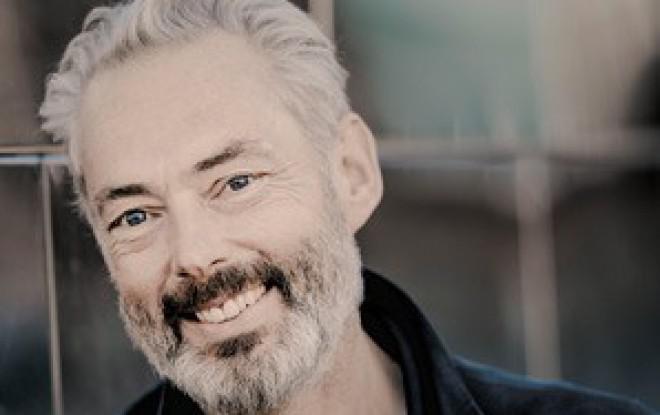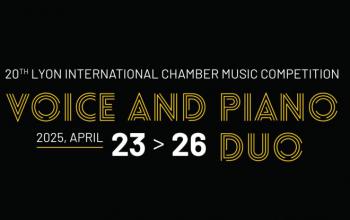
Mark Padmore on the upcoming 2025 Lyon competition
28 novembre 2024
The Violin Channel recently had a chat with British Tenor, Mark Padmore, to get advice on how to best prepare for a voice competition.
The 20th edition of the Lyon International Chamber Music Competition (CIMCL) will take place between April 23 and 26, 2025. Each year, the competition is addressed to a different chamber music ensemble and in 2025, it will adjudicate voice and piano duos.
Open to candidates under the age of 34, the CIMCL is offering a total of €19,000 in prize money — as well as concert engagements, a tour with La Belle Saison, training at the Académie musicale de Villecroze, and many other opportunities.
As one of the 2025 jury members, Mark Padmore sat down with us to tell us more!
How important are competitions in the development of a young singer?
I think that competitions can be enormously helpful in launching a career, but more than that, they provide an opportunity for focussed and put in the hard work in preparing repertoire. This is something that will be useful for all participants.
What are you looking for in a winner?
Different judges will look for different things and hopefully we will discover singers who have a great combination of qualities. Personally, I hope to hear singers who can really communicate a love of song.
What are the main qualities a young singer should develop in order to create a sustainable career?
First of all, one needs a strong appetite for hard work. Learning repertoire requires much more than just learning the notes. I would highlight generosity, curiosity, perseverance, imagination and enthusiasm.
When you have to collaborate with musicians on a short notice — just like the finalists will need to do with a string quartet — what is your best piece of advice to ensure a smooth collaboration?
Know your repertoire inside out and be prepared to share your understanding. Make sure that the quartet have read the text of the song and can join you in communicating the meaning.
How do you prepare yourself when embodying a specific character in a song?
Words come first. I try to read widely so that I can understand something about where the poem comes from. History is useful to gaincontext for what the poem is saying, but we also have to think about how it can be relevant to today's audience.
The candidates will need to perform short pieces from various composers and sing in multiple languages. How do you switch from one world to another in such a short period of time?
We have to develop the skills of an actor. It is more than switching hats — we really have to fully inhabit different personalities.
What would be the ideal repertoire for a competition such as this one?
Most importantly, choose repertoire that you love and have a desire to communicate to others. If you choose well-known songs, then don't just imitate another performer, find something new to say. If you choose unknown repertoire, make sure it is interesting and worthwhile and will intrigue the audience.
Did you have mentors or decisive moments during your training that propelled your career?
I have been lucky to work with many wonderful colleagues. I have learnt something from every single one. Equally important is going to great concerts, theatre, and film and read inggreat literature. Inspiration comes from many different sources.
What have been some of the highlights of your career?
Bach Passions with the Berlin Philharmonic in the Peter Sellars staging, Billy Budd at Glyndebourne, Death in Venice at Royal Opera House, and Schubert song cycles with Paul Lewis, amongst many others.
Mark Padmore is a British tenor who was voted 2016 Vocalist of the Year by Musical America. Artistic Director of the St. Endellion Summer Music Festival in Cornwall from 2012-2022, he was appointed CBE in the 2019 Queens’ Birthday Honours List.
Prior to a residency at Wigmore Hall in the 2021/22 season, he was Artist in Residence for the 2017/18 season with the Berlin Philharmonic and held a similar position with the Bavarian Radio Symphony Orchestra in 2016/17.
His extensive and award-winning discography includes Schumann Dichterliebe with Kristian Bezuidenhout and Schubert song cycles with Paul Lewis, both for Harmonia Mundi. Described by the New York Times as “Schubert Masters” Mark Padmore and Mitsuko Uchida recently embarked on a series of highly acclaimed, worldwide recitals and this partnership has culminated in a recording on Decca Classics of Schubert Schwanengesang and Beethoven An die ferne Geliebte.
This season Mark sings Evangelist in the St Matthew Passion with the Bavarian Radio Symphony Orchestra and Simon Rattle and with the Turku Philharmonic Orchestra; tours Japan appearing first at the Le Pont International Music Festival, followed by a recital at Topan Hall with the guitarist Yasuji Ohagi and ending the tour with performances of Britten Nocturne with the Gunma Symphony Orchestra.



